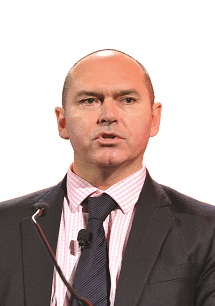News / Mackey insists CEPs must maintain quality while protecting patients’ rights
NHS Improvement chief executive Jim Mackey (right) has told providers that the capped expenditure process (CEP) must not harm patient safety or compromise patients’ NHS Constitution rights on choice and maximum elective waiting times.

In a letter sent to the 69 trusts involved in the CEP at the end of June, Mr Mackey said he wanted to clarify the oversight body’s expectations of the programme.
The CEP was launched at the beginning of the financial year to close the financial gap in some sustainability and transformation partnership (STP) areas. The STPs chosen for the process are those with the biggest gap between planned expenditure and budget allocation. This includes any allowance for overspends already built into the budget when control totals were set.
In the process, proposed spending on services is prioritised based on value and growth in activity is set at ‘reasonable but not excessive levels’. Discretionary investments are taken out and efficiency savings set at a challenging but achievable level.
Mr Mackey said the CEP was one element of the effort to support STPs to resolve their financial issues at a system level. However, initial CEP submissions will only be regarded as proposals at this stage – NHS Improvement, NHS England and the Department of Health will examine them over the next few weeks to understand their impact.
In the meantime, provider boards must be assured that they have considered the consequences of their plans and that they will not have an impact on patient safety and quality. CEP plans must be consistent with constitutional rights on patient choice and referral to treatment.
While backing the objectives of CEP, Mr Mackey urged providers not to be distracted by the process. ‘While I support the objectives of CEP – particularly that the process is undertaken on a collaborative basis – this exercise must be regarded as just one aspect of our collective efforts to deliver our financial obligations and live within the resources available.’
He added: ‘It is therefore important that CEP plans, where appropriate, supplement your board approved 2017/18 operational plan that you will already be delivering. Providers must not be distracted from delivering the individual financial savings plans that have already been worked up and assured from a patient safety and quality perspective. It is essential that providers continue the work to deliver these plans and build on the excellent progress made in 2016/17.’
BMA questions STPs
Sustainability and transformation partnerships (STPs) lack the necessary upfront funding, there has been poor engagement with clinicians and the public and plans are being implemented without evidence, according to the British Medical Association.

A BMA report said STPs required £9.5bn of capital funding, but were unlikely to receive anything like this amount. It questioned whether STPs would survive.
Freedom of information requests had
discovered that more than 150 jobs,
with combined annual salaries of at
least £8.5m, had been created to
deliver the plans.
BMA council chair Mark Porter (right)
said the plans were a cover for cuts of £26bn in health and social care. ‘It makes no sense to spend this kind of money on staffing and structure when we already know there is a huge shortfall in capital funding needed to actually put the plans in place,’ he said. ‘Any money spent here runs the risk of being completely wasted.’
Related content
The Institute’s annual costing conference provides the NHS with the latest developments and guidance in NHS costing.
The value masterclass shares examples of organisations and systems that have pursued a value-driven approach and the results they have achieved.